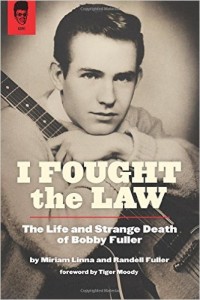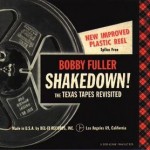Miriam Linna and Randell Fuller, I Fought the Law (2014)
Wednesday, September 30th, 2015 Miriam Linna’s 1988 Kicks magazine cover story about Bobby Fuller brought him to life in a way few other writers could do. This is because her enthusiasm for – and knowledge of – Fuller’s records and the music that inspired him revved up her feature like a V8 engine. The gloom surrounding his mystery death couldn’t possibly enshroud the euphoric sound she celebrated. (It was also packed with historical details available nowhere else. I remember a Saturday I spent in the early ’90 zigzagging across El Paso with a copy of the magazine on the dashboard, locating all the sites she pinpointed.)
Miriam Linna’s 1988 Kicks magazine cover story about Bobby Fuller brought him to life in a way few other writers could do. This is because her enthusiasm for – and knowledge of – Fuller’s records and the music that inspired him revved up her feature like a V8 engine. The gloom surrounding his mystery death couldn’t possibly enshroud the euphoric sound she celebrated. (It was also packed with historical details available nowhere else. I remember a Saturday I spent in the early ’90 zigzagging across El Paso with a copy of the magazine on the dashboard, locating all the sites she pinpointed.)
Her new book, titled I Fought the Law: The Life and Strange Death of Bobby Fuller, is a different, darker sort of prospect, which it perhaps has to be. It includes much of that first Kicks piece but adds material from Bobby’s brother Randy and lots of extended quotes from other first hand sources. While the death doesn’t get solved, you get a clear sense of the motivating factors and which parties likely qualify for the hayride to hell.
A sense of desolation takes the forefront in I Fought the Law to the extent that you wonder if that, too, wasn’t as crucial to the Fuller sound as its trademark euphoria. Tiger Moody’s foreword gives the doom Bobby sings of in his most famous song an alternate, but no less stifling, context. (This instantly made my personal racing lit Hall of Fame.) Randy’s introduction recounts the devastating ride home to El Paso from Los Angeles in the never-to-be-impounded death car, reeking of the gasoline that once drenched Bobby’s dead body. Also included is the stark and detailed revelation that the Fuller family had already suffered through the murder of Bobby and Randy’s older stepbrother.
Then there’s passages like this, spoken by Randy who ruminates on his decision to join his brother’s band full time and to go wherever it would take him (p. 57): “In El Paso, there was nothing for me, period…You’d get days when the wind would blow, and sand would be blowing across the street, and the clouds were a certain way, and it just seemed like there was never anything good ever gonna happen. It was a hopeless place. It was hopeless from the day we got there…[A]ll I would do is get in my car, and I’d drive all the way to northeast El Paso, watching the sand blow across the desert by the airport, and watch rabbits and wild things run across the road, and then I’d drive all the way over there where the teen club was and turn around and drive home. That was my thrill.”
If a second edition of I Fought the Law is ever in the works, I hope that a “where are they now” appendix makes the cut, especially since Randy’s introduction stokes reader interest for such after-the-funeral info. (Maybe, too, some of the long transcribed quotes can get a trim and some of the typos mopped up a bit.) The best reason for a second edition, though, would be that positive developments in the Bobby Fuller story would call for one, and I wouldn’t want anyone but Miriam Linna or Randy Fuller to deliver the news.


